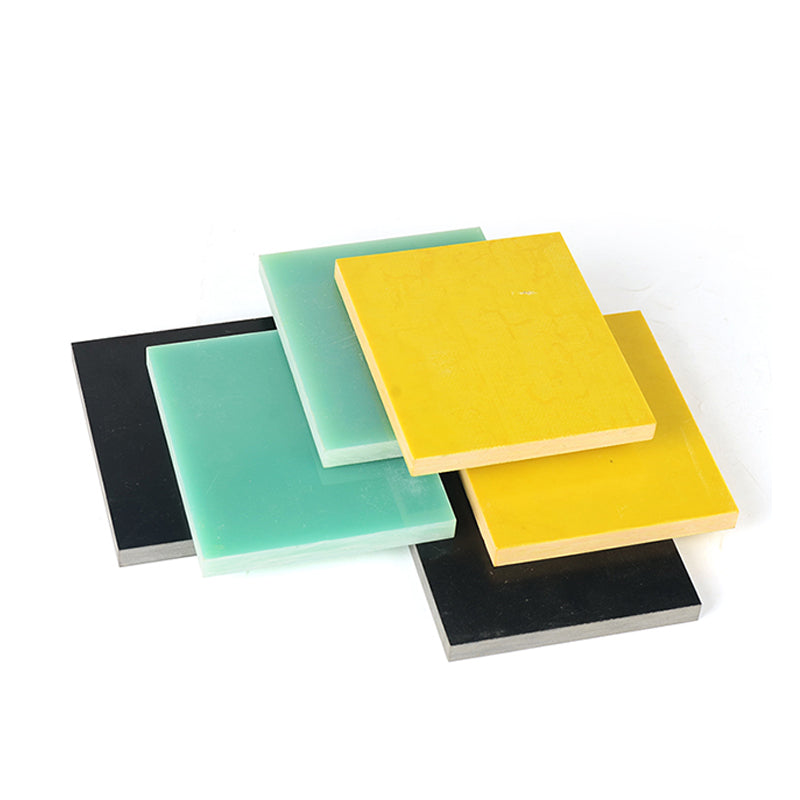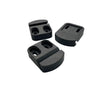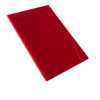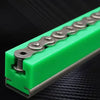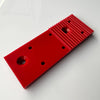Exploring Bakelite Properties: The Ideal Solution for High-Performance Electrical Insulation
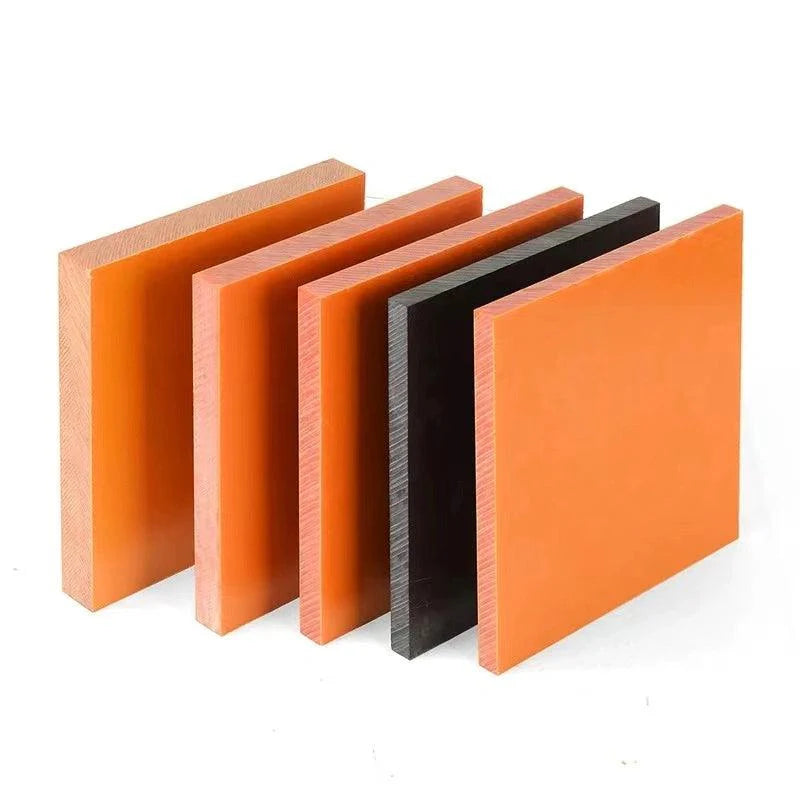
In this in-depth blog post, discover why Bakelite stands out as the premier choice for high-performance electrical insulation. With a unique combination of properties, Bakelite material offers exceptional heat resistance, durability, and electrical insulating capabilities, making it indispensable in modern industries. Whether you’re sourcing Bakelite sheets for automotive, aerospace, or electrical equipment, understanding the specific benefits of Bakelite plastic and Bakelite synthetics can significantly enhance the quality and longevity of your projects.

From the mechanical strength of Bakelite to its unparalleled thermal stability, this post delves into how Bakelite sheets meet the stringent demands of high-stress environments. Additionally, you’ll find practical insights on how to choose the right Bakelite board supplier, ensuring you receive the highest quality Bakelite sheet for your specific needs. Whether you're looking for Bakelite sheet for sale or exploring its properties for your next project, this guide provides all the essential information to make informed decisions.
Understanding Bakelite’s Electrical Insulation Properties
The Unique Composition of Bakelite
Bakelite is renowned for its outstanding electrical insulation properties, a characteristic that stems from its unique composition of phenolic resin. This thermosetting polymer, created by combining phenol and formaldehyde, undergoes a polymerization process that results in a material with exceptional dielectric strength. The phenolic resin in Bakelite material forms a robust, non-conductive barrier, making it an ideal choice for high-performance applications where electrical insulation is critical.
How Phenolic Resin Enhances Electrical Insulation
The key to Bakelite’s superior electrical insulation lies in its structure. The phenolic resin used in Bakelite plastic forms a cross-linked polymer network, which significantly reduces the flow of electrical currents. This makes Bakelite synthetics particularly effective in environments where high voltage and heat are present. Moreover, the low water absorption rate of Bakelite sheets ensures that their insulating properties remain stable even in humid conditions, further enhancing their reliability in demanding electrical applications.
Applications of Bakelite in Electrical Insulation
Given its unique insulating properties, Bakelite is widely used in the production of electrical insulators, switchgear, and other components that require reliable insulation. In these applications, Bakelite sheet provides a stable, non-conductive surface that prevents the unwanted flow of electricity, thereby protecting both equipment and users. Its thermal stability also allows Bakelite to maintain its insulating properties under extreme conditions, making it a preferred material in industries ranging from electronics to automotive.
Why Bakelite is a Preferred Choice for High-Performance Applications
Bakelite's combination of electrical insulation, mechanical strength, and heat resistance makes it an unparalleled choice for high-performance applications. Whether you are sourcing Bakelite sheets for sale or looking for a reliable Bakelite board supplier, understanding these properties will help you select the right material for your needs. The ability of Bakelite to withstand high temperatures and electrical stress ensures that it continues to be a go-to material for electrical insulation in various industries.

Comparing Bakelite with Other Insulating Materials
Bakelite vs. Ceramics: Insulation Efficiency and Mechanical Strength
When comparing Bakelite with ceramics, it’s essential to consider both insulation efficiency and mechanical strength. Ceramics are well-known for their excellent thermal resistance and insulating properties. However, ceramics are inherently brittle, making them susceptible to fractures and breakage under mechanical stress. This brittleness limits their application in environments where mechanical durability is crucial.
On the other hand, Bakelite material offers a unique combination of electrical insulation and mechanical resilience. Unlike ceramics, Bakelite plastic can withstand significant physical stress without cracking or breaking, making it a more reliable option in demanding industrial applications. Additionally, Bakelite synthetics provide excellent dielectric strength, similar to ceramics, but with added durability, making them a top choice for both electrical insulation and mechanical applications.
Fiberglass vs. Bakelite: Cost-Effectiveness and Ease of Fabrication
Fiberglass is another popular insulating material known for its thermal stability and non-conductive properties. However, when compared to Bakelite sheets, fiberglass has certain drawbacks that affect its overall cost-effectiveness. Fiberglass is often more challenging to fabricate and handle, as its fibrous nature can cause irritation during processing and installation.
In contrast, Bakelite is easier to machine and mold into various shapes and sizes, which simplifies the manufacturing process. This ease of fabrication, combined with Bakelite's robust insulating capabilities, often makes it a more economical choice, especially for large-scale applications. Additionally, Bakelite sheets provide a smoother surface finish, which can be beneficial in applications where aesthetics and precision are important.
Bakelite vs. Newer Synthetics: Balancing Performance and Affordability
With the advent of newer synthetic materials like polyimides and PEEK, the insulation landscape has expanded with options that offer high-temperature resistance and superior electrical properties. However, these advanced materials come at a significantly higher cost, which may not always be justified depending on the application.
Bakelite strikes an effective balance between performance and affordability. While newer synthetics might offer marginal improvements in specific areas, Bakelite synthetics provide reliable insulation, heat resistance, and mechanical strength at a fraction of the cost. For industries where cost-effectiveness is a priority, without sacrificing essential performance characteristics, Bakelite remains a preferred choice.
Industry Preference for Bakelite: A Proven Track Record
Despite the availability of newer materials, Bakelite continues to be favored across various industries for its proven reliability and cost-effectiveness. Whether used in electrical insulation, automotive components, or industrial machinery, Bakelite sheets offer a versatile solution that meets the high standards required in these sectors.
By understanding the properties of Bakelite and how it compares with other insulating materials, industries can make informed decisions that align with both their performance needs and budget constraints. When sourcing Bakelite sheet for sale or choosing a Bakelite board supplier, it’s clear that Bakelite offers a competitive edge in both insulation efficiency and overall value.

The Role of Bakelite in Modern Electrical Equipment
Bakelite in Transformers: Ensuring Reliable Electrical Insulation
Bakelite plays a crucial role in the construction and operation of modern transformers. Transformers, essential components in electrical grids, rely on materials that offer both electrical insulation and mechanical stability. Bakelite sheets are often used as insulation barriers within transformers, providing a stable, non-conductive layer that prevents electrical shorts and enhances the transformer’s overall efficiency.
The phenolic resin in Bakelite material gives it a high dielectric strength, enabling it to withstand the intense electrical fields present within transformers. Additionally, Bakelite’s resistance to heat and chemical degradation ensures that it maintains its insulating properties over time, even under the demanding conditions of a transformer in operation. This makes Bakelite plastic a preferred choice in the design and manufacturing of transformers, where reliability and longevity are paramount.
Bakelite Sheets in Switchboards: Enhancing Safety and Performance
Switchboards, the hubs of electrical distribution, require materials that can handle both high voltage and the associated thermal loads. Bakelite sheets are extensively used in switchboards due to their excellent insulating properties and ability to resist high temperatures. In these applications, Bakelite acts as an insulating barrier between electrical components, preventing short circuits and ensuring the safe operation of the electrical system.
Moreover, Bakelite’s mechanical strength ensures that it can support the physical stresses encountered in switchboards, such as vibrations and mechanical impacts. This durability, combined with its electrical insulating capabilities, makes Bakelite synthetics an indispensable material in the construction of switchboards used in industrial, commercial, and residential settings.
High-Stress Environments: Bakelite's Role in Electrical Equipment
In addition to transformers and switchboards, Bakelite is used in various other high-stress environments within the electrical industry. Its ability to maintain structural integrity and insulation efficiency under high thermal and electrical stress makes it suitable for use in motor insulation, generator components, and circuit breakers. Bakelite boards provide a stable platform for these applications, ensuring that the equipment operates safely and efficiently.
For instance, in motors, Bakelite is often used to insulate winding wires, preventing short circuits and protecting the motor from electrical failures. The material’s resistance to high temperatures also makes it ideal for use in components that are subject to continuous thermal cycling, such as those found in generators and circuit breakers.
Why Bakelite is Preferred in Modern Electrical Equipment
The preference for Bakelite in modern electrical equipment is largely due to its combination of electrical insulation, thermal stability, and mechanical strength. These properties ensure that Bakelite sheets and Bakelite boards can meet the rigorous demands of high-stress environments while providing long-lasting performance. For manufacturers and engineers looking to enhance the safety and reliability of electrical systems, Bakelite remains a go-to material.
When sourcing Bakelite sheet for sale or selecting a Bakelite board supplier, it’s important to consider these applications and the specific requirements of your electrical equipment. By understanding the role of Bakelite in these critical components, you can make informed decisions that contribute to the efficiency and safety of your electrical systems.

How Bakelite Sheets Contribute to Heat Resistance and Durability
The Phenolic Resin’s Role in Heat Resistance
Bakelite sheets are renowned for their impressive heat resistance, which is primarily attributed to the phenolic resin used in their composition. This thermosetting polymer undergoes a curing process that creates a cross-linked molecular structure, giving Bakelite its remarkable ability to withstand high temperatures without losing its structural integrity. Unlike thermoplastics, which soften and melt when exposed to heat, Bakelite material maintains its form and properties, making it an ideal choice for applications in environments where consistent exposure to high temperatures is a concern.
The phenolic resin in Bakelite also provides excellent resistance to thermal degradation. This means that Bakelite sheets do not break down or lose their insulating properties when subjected to prolonged heat, making them suitable for use in critical electrical components, industrial machinery, and automotive parts where heat resistance is essential.
Durability in High-Temperature Applications
The durability of Bakelite sheets is not only due to their heat-resistant properties but also to their mechanical strength. Bakelite plastic can withstand significant mechanical stress while operating at high temperatures, ensuring that it remains reliable in demanding conditions. This combination of heat resistance and mechanical durability is why Bakelite is commonly used in applications such as brake pads, clutch facings, and thermal insulation in engines and industrial machinery.
In high-temperature environments, materials are often subjected to thermal cycling, where they repeatedly heat up and cool down. Bakelite synthetics are specifically designed to endure these cycles without warping, cracking, or losing their insulating properties. This makes Bakelite sheets particularly valuable in industries where both thermal stability and mechanical resilience are critical.
Applications Where Heat Resistance is Crucial
Bakelite’s heat resistance makes it a preferred material in a wide range of applications. In the electrical industry, Bakelite boards are used in switchboards, transformers, and electrical insulators that must operate safely under high thermal stress. The material’s ability to resist heat ensures that it can effectively prevent electrical failures and protect equipment from overheating.
In the automotive sector, Bakelite sheets are used in components that are regularly exposed to high temperatures, such as engine gaskets, thermal shields, and exhaust systems. Here, Bakelite’s durability under heat not only contributes to the longevity of the parts but also enhances the safety and performance of the vehicle.
Moreover, in industrial machinery, Bakelite’s heat-resistant properties allow it to be used in manufacturing equipment that must operate under extreme temperatures. This includes molds, presses, and machining jigs, where the material’s stability under heat is crucial for maintaining precision and quality in the production process.
Bakelite: A Trusted Material for High-Temperature Durability
Given its ability to resist high temperatures while maintaining mechanical strength, Bakelite continues to be a trusted material across various industries. When sourcing Bakelite sheet for sale or considering a Bakelite board supplier, it’s important to understand these heat-resistant qualities to ensure you choose the right material for your specific application needs.

Customizing Bakelite Sheets for Specific Industrial Needs
Tailoring Size and Thickness for Industry Applications
Bakelite sheets are widely used across various industries due to their versatility and adaptability to specific requirements. One of the most significant aspects of customizing Bakelite involves tailoring the size and thickness of the sheets to meet the unique demands of different applications. Whether you’re in the automotive industry, electrical equipment manufacturing, or industrial machinery production, selecting the right Bakelite sheet size and thickness is crucial for optimizing performance and durability.
For example, thinner Bakelite sheets, ranging from 1mm to 3mm, are ideal for applications that require precision and flexibility. These are often used in electrical insulation components, such as printed circuit boards (PCBs), where space constraints and lightweight materials are critical. In contrast, thicker Bakelite sheets, such as those between 10mm and 12mm, are better suited for applications requiring mechanical strength and thermal stability, like in automotive components and heavy-duty industrial equipment.
Customizing Material Properties for Enhanced Performance
Beyond size and thickness, Bakelite can be customized by altering its material composition to enhance specific properties, such as thermal resistance, electrical insulation, and mechanical durability. For industries that operate in high-temperature environments, Bakelite sheets can be formulated with additives that improve heat resistance and flame retardancy. This customization ensures that the material not only withstands extreme temperatures but also maintains its insulating properties over time.
In the electronics industry, where precise insulation is paramount, Bakelite can be engineered to offer superior dielectric strength, ensuring that it can handle high voltages without breaking down. Customizing Bakelite synthetics in this way makes them ideal for use in transformers, switchgear, and other critical electrical components.
Surface Finishing and Fabrication for Specialized Uses
Another essential aspect of customizing Bakelite sheets involves surface finishing and fabrication. Depending on the intended application, Bakelite can be machined, drilled, and shaped into various forms while maintaining its structural integrity. For instance, Bakelite boards used in the automotive industry often undergo surface treatments to improve wear resistance and aesthetic appeal, making them suitable for visible interior components.
In industrial applications, Bakelite sheets may be cut to precise dimensions or laminated to enhance their mechanical properties. These customizations ensure that the Bakelite material meets the specific needs of each industry, whether it’s used in the production of machinery parts, thermal insulators, or protective barriers.
Industry-Specific Customization Options
Different industries have distinct needs when it comes to Bakelite customization. For instance, in the aerospace industry, where weight and strength are critical, Bakelite sheets can be customized to provide a balance between lightweight properties and structural integrity. In contrast, the construction industry might require Bakelite boards with enhanced fire resistance and dimensional stability for use in architectural applications.
Selecting the right Bakelite board supplier who offers a range of customization options is key to ensuring that the material aligns with your project’s requirements. Whether you’re looking for Bakelite sheet for sale with specific thicknesses or seeking custom formulations to meet stringent electrical insulation standards, understanding these customization possibilities will help you achieve optimal results.
Bakelite’s Mechanical Strength and Its Impact on Longevity
Understanding Bakelite's Wear Resistance
Bakelite is highly valued for its impressive wear resistance, a property that plays a crucial role in the material's longevity, especially in demanding industrial applications. This resistance to wear is primarily due to the dense, cross-linked structure of the phenolic resin used in Bakelite material. As a thermosetting polymer, Bakelite doesn’t melt or deform under mechanical stress, which makes it exceptionally durable in environments where friction and abrasion are constant challenges.
In the context of electrical insulation components, Bakelite sheets and boards are often exposed to high levels of friction and wear, particularly in applications such as switchgear, transformers, and industrial machinery. The wear resistance of Bakelite ensures that these components maintain their insulating properties over extended periods, even under harsh operating conditions. This not only enhances the reliability of the equipment but also reduces the need for frequent maintenance or replacement, contributing to cost savings over time.
Impact Durability: Protecting Components in High-Stress Environments
Another critical aspect of Bakelite's mechanical strength is its impact durability. Bakelite is engineered to absorb and dissipate energy from mechanical impacts, making it highly resistant to cracking or breaking under pressure. This property is particularly important in high-stress environments, such as automotive and aerospace applications, where components must withstand significant physical forces without compromising their structural integrity.
For electrical insulation components, Bakelite's impact durability ensures that these parts remain functional even when subjected to mechanical shocks or vibrations. This is especially relevant in environments where electrical systems are exposed to external forces, such as in transportation infrastructure or heavy machinery. By maintaining their mechanical integrity, Bakelite boards help prevent electrical failures that could result from damage to the insulation materials, thereby enhancing the overall longevity and reliability of the equipment.
Longevity Through Thermal and Mechanical Stability
The combination of wear resistance and impact durability also contributes to Bakelite's thermal stability. Unlike other materials that may degrade or lose their structural properties under prolonged exposure to heat, Bakelite retains its mechanical strength even at elevated temperatures. This makes Bakelite sheets an ideal choice for applications where both thermal resistance and mechanical durability are required, such as in electrical enclosures, industrial equipment, and automotive components.
The ability of Bakelite to withstand both thermal and mechanical stress over long periods significantly extends the lifespan of the components made from this material. This extended lifespan not only improves the reliability of the equipment but also minimizes downtime and maintenance costs, making Bakelite a cost-effective solution for industries that demand high performance and durability.
Applications Where Bakelite's Mechanical Strength is Critical
Given its exceptional mechanical strength, Bakelite is widely used in applications where durability and longevity are critical. In the automotive industry, for example, Bakelite is used in brake pads, clutch facings, and other components that require high wear resistance and the ability to withstand mechanical shocks. Similarly, in the electrical industry, Bakelite sheets are used in transformers and switchboards, where their insulating properties and mechanical strength ensure safe and reliable operation over long periods.
When sourcing Bakelite sheet for sale or selecting a Bakelite board supplier, understanding the mechanical properties of Bakelite and how they contribute to the material's longevity can help you choose the right product for your specific needs. Whether you require Bakelite for electrical insulation, industrial machinery, or automotive applications, its mechanical strength ensures that your components will perform reliably and last longer in even the most challenging environments.

Choosing the Right Bakelite Board Supplier for Your Project
The Importance of Quality in Bakelite Boards
When selecting a Bakelite board supplier, one of the most critical factors to consider is the quality of the Bakelite sheets being offered. High-quality Bakelite material ensures that the boards will perform reliably in your applications, whether they are used for electrical insulation, industrial machinery, or automotive components. Inferior quality Bakelite may not possess the same thermal resistance, mechanical strength, or electrical insulating properties, which could lead to failures and costly downtime in your projects.
To ensure you are purchasing from a supplier that provides high-quality Bakelite boards, look for certifications or compliance with industry standards. Reputable suppliers will often provide detailed technical specifications and testing data for their products, giving you confidence in the material's performance. Additionally, customer reviews and testimonials can provide insights into the supplier's track record and the reliability of their products in real-world applications.
Customization Options to Meet Specific Project Needs
Another key consideration when choosing a Bakelite board supplier is the range of customization options they offer. Different industries have specific requirements in terms of Bakelite sheet size, thickness, and material properties, and your supplier should be able to accommodate these needs. For example, if your project requires Bakelite sheets with enhanced thermal resistance or mechanical durability, your supplier should offer options to tailor the Bakelite composition to meet these demands.
Custom cutting, drilling, and surface finishing services are also important aspects of Bakelite customization. A supplier that can provide precise fabrication services will save you time and resources, allowing you to focus on the core aspects of your project. When evaluating suppliers, inquire about their customization capabilities and ensure they have the necessary equipment and expertise to deliver Bakelite boards that match your exact specifications.
Evaluating Supplier Reputation and Reliability
The reputation of your Bakelite board supplier is another crucial factor that can impact the success of your project. A supplier with a strong reputation in the industry is more likely to deliver high-quality Bakelite sheets consistently and on time. Look for suppliers with a history of working with reputable companies in your industry, as this can be a strong indicator of their reliability and ability to meet stringent quality standards.
You can assess a supplier's reputation by checking online reviews, industry forums, and case studies. Additionally, consider reaching out to their past clients to get first-hand feedback on their experiences. A supplier with a solid reputation is more likely to be transparent in their dealings and provide the necessary support throughout the purchasing process, ensuring that you receive the right Bakelite material for your needs.
Ensuring Supplier Support and Service
Finally, the level of support and service offered by a Bakelite board supplier is an essential factor to consider. A reliable supplier should provide excellent customer service, offering guidance and technical support during the selection process. This includes helping you choose the right Bakelite sheets for your specific application, providing detailed product information, and assisting with any customization requirements.
Good communication is key to ensuring that your orders are processed accurately and delivered on time. A supplier who is responsive and attentive to your needs can help prevent delays and ensure that your project stays on track. When evaluating potential suppliers, consider their responsiveness to inquiries and their willingness to work closely with you to meet your project’s requirements.
Making the Right Choice
Selecting the right Bakelite board supplier is essential for the success of your project. By prioritizing quality, customization options, and supplier reputation, and ensuring that you receive the necessary support and service, you can be confident that your Bakelite sheets will perform as expected, contributing to the reliability and longevity of your applications. Whether you’re sourcing Bakelite sheet for sale or looking for a long-term supplier partnership, taking these factors into account will help you make an informed decision.

Common Questions and Answers Related to Bakelite and BeePlastics Customization
1. What makes Bakelite an ideal material for electrical insulation?
Answer: Bakelite is highly regarded for its exceptional electrical insulation properties due to its phenolic resin composition. This material offers high dielectric strength, low water absorption, and excellent thermal resistance, making it perfect for use in electrical components like transformers, switchgear, and circuit boards. Its ability to withstand high voltages and prevent electrical shorts ensures safety and reliability in demanding applications.
2. Can BeePlastics customize Bakelite sheets for specific industrial needs?
Answer: Yes, BeePlastics can undertake any customization of Bakelite sheets, including both sample and batch customization. Whether you need specific sizes, thicknesses, or material properties tailored to your project, BeePlastics can deliver. We provide custom cutting, drilling, and surface finishing services to ensure the Bakelite sheets meet your exact specifications.
3. What file formats does BeePlastics accept for customization requests?
Answer: BeePlastics accepts a variety of file formats for customization, including PDF, CAD, and other standard design formats. This flexibility allows customers to submit detailed designs or specifications for precise customization of Bakelite sheets or other plastic materials, ensuring the final product meets their needs.
4. Is there a minimum order quantity (MOQ) for Bakelite sheet customization?
Answer: No, there is no minimum order quantity (MOQ) at BeePlastics. We cater to both small and large orders, allowing you to order exactly what you need, whether it's a single sample piece or a large batch for mass production. This approach is ideal for businesses of all sizes, offering flexibility in order quantities.
5. How does BeePlastics manage the production cycle for custom Bakelite sheets?
Answer: The production cycle at BeePlastics is tailored according to the size and complexity of your order. We carefully plan and execute each project, ensuring that even intricate designs are produced efficiently. Throughout the process, BeePlastics communicates the production progress in real time, keeping you informed of the status and expected delivery timelines.
6. Can I request a sample of Bakelite material before placing a bulk order?
Answer: Yes, BeePlastics supports the provision of samples for customers who want to evaluate the material before committing to a bulk order. The sample is provided free of charge; however, the customer is responsible for the shipping costs. This allows you to assess the quality and suitability of the Bakelite material for your specific application.
7. What are the typical applications of customized Bakelite sheets?
Answer: Customized Bakelite sheets are used in a wide range of applications across various industries. Common uses include electrical insulation in transformers and switchgear, thermal barriers in industrial machinery, and mechanical components in automotive parts. BeePlastics can tailor Bakelite sheets to meet the specific needs of these applications, ensuring optimal performance.
8. How does BeePlastics ensure the quality of customized Bakelite sheets?
Answer: BeePlastics maintains strict quality control throughout the customization process. We use high-quality Bakelite materials and advanced manufacturing techniques to ensure that each sheet meets industry standards. Additionally, we conduct thorough testing and inspections before delivery to guarantee the reliability and durability of our products.
9. What are the benefits of choosing BeePlastics as my Bakelite board supplier?
Answer: Choosing BeePlastics as your Bakelite board supplier comes with several benefits. We offer high-quality customization services, no minimum order quantity, and excellent customer support. Our team of experts is always available to assist with design, customization, and technical questions, ensuring that you receive the best possible solution for your project.
10. How can I get a quote for customized Bakelite sheets from BeePlastics?
Answer: To get a quote for customized Bakelite sheets, simply contact BeePlastics with your project details, including the desired specifications, quantity, and file formats. Our team will review your requirements and provide a competitive quote, along with an estimated production timeline. We strive to offer transparent pricing and fast responses to help you plan your project efficiently.
When considering Bakelite for your next project, it's essential to recognize the material's unmatched properties, including electrical insulation, mechanical strength, and thermal resistance. These characteristics make Bakelite sheets an excellent choice across various industries, from automotive to electrical equipment manufacturing. By selecting a reliable Bakelite board supplier like BeePlastics, you can ensure that your customized Bakelite components meet the highest standards of quality and performance. Whether you need small samples or large-scale production, BeePlastics offers the flexibility, expertise, and support necessary to help you achieve success with your specific application.

Looking for high-quality Bakelite sheets? Get in touch by filling out the contact form below to start your project with BeePlastics. Or, if you’re ready to shop, jump directly to our Bakelite collection here: View Bakelite Products.
-
Posted in
Bakelite applications, Bakelite benefits, Bakelite properties, electrical insulation, electrical materials, high-performance insulation, insulation materials, mechanical strength, thermal stability

